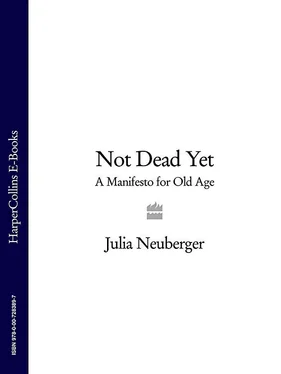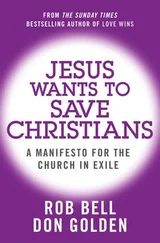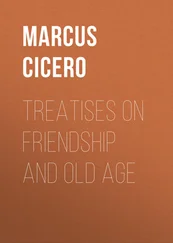Work gives purpose and meaning in our culture. We have failed to find the key to being less active, economically or purposefully, and still find meaning in life. ‘What do you do?’ is the question of choice, rather than ‘Who are you and what are you like?’ There was no clear way for my mother to be simply my mother – Liesel Schwab – with all her expertise in art, her stories of life in Germany before the war, her accounts of being a refugee in London during the war, and her first few months in Birmingham before that. Her life, with its rich history and her hundreds of friends, was just not enough to satisfy her.
So my recent experience as a middle-aged carer of older people has convinced me we have got it wrong. More and more, it has made me feel we demean older people even when we do the best we possibly can under our present system. We make them feel worthless, past it, of no use, superfluous, as if they should have died years ago. When we give them help, we do things for them, rather than with them. More than anything else, this has made me question what it is to grow old in modern Britain and what it means to be an old person where old people are numerous and seen as a burden. It has also led me to ask whether we could make it any different.
I am certainly not the first person to formulate the questions in this way. Some of those conclusions have almost become truisms. Yet why are some of the basic changes that could be made, the most obvious ones – often relatively easy to achieve – still not being done? That, I believe, is what makes this book a little different. It recognizes that there are reasons, beyond the inadequacies of health policy or pensions policy, why we accept the inhuman situation for what it is, that we accept treatment for our older relatives that would cause an outcry if it was meted out to any other sections of society. It tries to stitch some of those reasons together and to come up with a practical way forward.
Because the real question is why we put up with this situation. If we look at our care system, still largely based on the Victorian Poor Law approach – assuming that the recipients should be grateful to get anything at all – we have to wonder why we don’t get angrier about it than we do. We have to ask why we so rarely get furious about it, why we put up with it for parents and relatives and, unless we act quickly, for ourselves.
One of the experiences which opened my eyes almost more than anything else was the more recent decline of my uncle. He was Jewish, very orthodox, and gradually found himself unable to cope. It was never clear quite what was wrong with him, but he was becoming incontinent, and on the hospital ward kept on pulling his clothes off.
He would never have allowed anyone to see him naked, if he had been himself, and it was extremely distressing for us to see him acting in a way that was totally against every rule he had lived his life by. But when we raised this with the ward staff, they just said: ‘Oh, we put clothes on him and he just takes them off again.’
They were not under-staffed. They could have asked about who this person they were treating was, and what he would feel about being allowed to wander around naked. If he kept taking his clothes off, then they ought to have discussed some practical solution, by sewing him in or clipping them on in such a way that they could not be taken off. They had objectified the people in their care, and had no sense of and no interest in who they were.
Of the four institutions which cared for my uncle before he died, one was different, and was the proof for me that something different is possible.
This was a London teaching hospital, about four miles away from the one which had performed so badly. It was very short-staffed, but my uncle was treated with incredible kindness before he finally began to slip away and became unconscious. Even then, the staff were going up to him and talking to him in case he could still hear. They didn’t patronize him by calling him ‘Harry’. It was clear to them that the person they were treating was a rather dignified old man, and they treated him as such.
But this story of inadequate, patronizing and inhumane care at the very end of life is reflected in the years before. What I want to do in this book is to look behind the immediate questions – why, for example, specific care is so poor – to ask something more fundamental. Is life as an older person in Britain today much fun? Are we thinking completely incorrectly about old people anyway by lumping them all together when, like everyone else, they could not be more different one from another? Does the state have a case to answer, or have old people themselves not been sufficiently voluble in the debates about pensions, care and costs?
This investigation is intended as a manifesto for old age. It asks whether, if we had ‘run the film backwards’ from old age to youth – as Sydney Carter suggests in his poem at the beginning of this book – we might see it all very differently. It also assumes that a generation will emerge, even if we are not quite there yet, which will simply not put up with what we have now. They – certainly we – will be impatient with excuses, demanding of services, demanding of other people, and, in short, as near an approximation to grey power as we are likely to see in the UK. We need to look inside ourselves and see why it is we accept such cruel and miserable lives for so many of our older people, our parents and – at the rate we are going – for ourselves. Many people lead wonderful lives as they get older. But when people don’t, and when they end their lives in misery and degradation, it is we who allow it to happen.
This is the shape of the manifesto, and I will put some guts to it as each chapter goes by. Each chapter will end with a call to arms. What I want to see is an emerging ‘grey power’ movement, including all of us – old, young and middle-aged – who can make this happen. The chapters correspond to the key areas which need to be tackled:
1 Don’t make assumptions about my age: end age discrimination
We need to have a clearer idea what constitutes a successful old age, and a sense of how that might differ from person to person. The mechanistic and medical definitions of professionals clearly don’t sum up what might be very different experiences of various levels of physical ill-health and disability. Real people break out of those definitions but policy still traps them there.
That has to be set against new pictures of how we age and what we do at what stage of our lives. The age at which we have children is changing. Is 50 the new 30? Rates of teenage pregnancy in the past 20 years have never been higher in the modern era, but at the same time many women are delaying having their babies. The number of women having children in their thirties and forties has climbed steadily over the last 20 years, at a time when the overall birth rate has been dropping. In 2003, the fertility rates for women age 35–39 and over 40 both increased by almost 8 per cent.
As women may now be able to – and choose to – conceive well into their fifties and, eventually, perhaps beyond, older women may have sons and daughters who are going through the throes of adolescence or establishing themselves at work just at the time when the older person might need a bit of help, unless we are to live so much longer that dependent old age will not hit us until we are 95 or more. Indeed, from some 8,000 of us who reached 100 in 1997, there will be 30,000 or more in 2030 – and that is a relatively conservative estimate.
But it is easy to be blinded by the figures if we have no clear idea about what old age means, what we want from it, and how to get it, especially as we are likely to be treated – when the time comes – as if we have no opinions on the subject and are happy to sit in front of the television in our care homes.
Читать дальше












